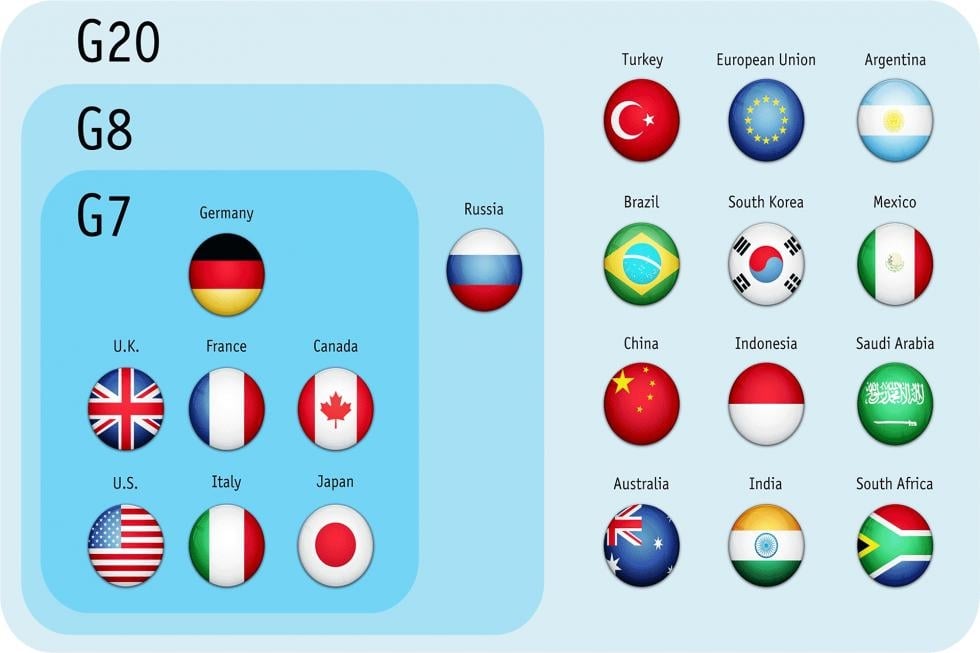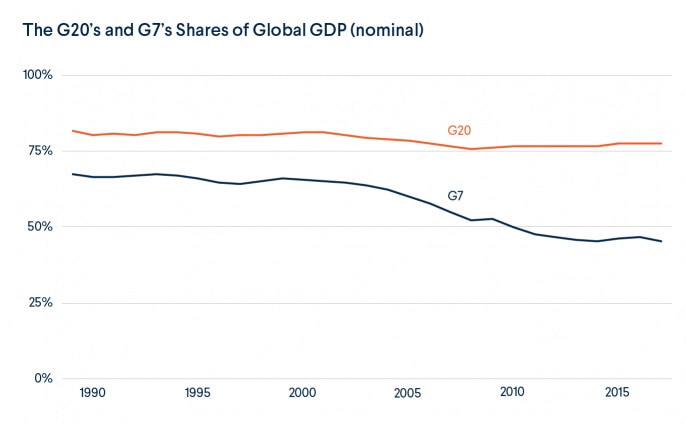Important International institutions – G-7
The Group of Seven (G7) is an inter-governmental political forum consisting of Canada, France, Germany, Italy, Japan, the United Kingdom and the United States. Its members are the world’s largest IMF advanced economies and wealthiest liberal democracies; The group is officially organized around shared values of pluralism and representative government
The Group of Seven (G-7) is an informal bloc of industrialized democracies—France, Germany, Italy, the United Kingdom, Japan, the United States, and Canada—that meets annually to discuss issues of common interest like global economic governance, international security and energy policy.
History
- The G-7 has its roots in an informal meeting of the finance ministers of France, West Germany, the U.S, Great Britain, and Japan (the Group of Five) in the wake of the 1973 oil crisis.
- The French President invited the leaders of West Germany, U.S, Great Britain, Japan and Italy, to Rambouillet (France) in 1975 for further discussions on global oil crisis.
Membership
- France, West Germany, Italy, Japan, the United Kingdom, and the United States formed the Group of Six in 1975 to provide a venue for the industrialized democracies to address pressing economic concerns.
- In 1976, Canada was also invited to join the group and the first meeting with all G-7 nations was hosted by the United States which was held in Puerto Rico in 1976.
- The European Union has participated fully in the G-7 since 1981 as a “non enumerated” member.
- It is represented by the presidents of the European Council, which represents the EU member states’ leaders, and the European Commission (the E.U.’s executive branch)
- The G-7 was known as the G-8 for several years after the original seven were joined by Russia in 1997. The inclusion of USSR in G-7 was meant as a signal of cooperation between East and West after the Soviet Union’s collapse in 1991.
- The group returned to being called G-7 after Russia was expelled as a member in 2014 following the annexation of the Crimea region of Ukraine.
- There are no formal criteria for membership, but participants are all highly developed democracies. The aggregate GDP of G-7 member states makes up nearly 50% of the global economy and 10% of the world’s population.
Summit Participation
- Summits are held annually and hosted on a rotation basis by the group’s members. The host country not only holds the G7 presidency but also sets the agenda for the year.
- Invitation to Global leaders are sent by host nation to participate in summit as special invitees. Countries like China, India, Mexico, and Brazil have attended summit at various occasions.
- The leaders of important international organizations like European Union, IMF, World Bank and the United Nations are also invited.
Sherpas
- The groundwork for the Summit, including matters to be discussed and follow-up meetings, is done by the “sherpas”, who are generally personal representatives or members of diplomatic staff such as ambassadors.

G-7 and G-20
- G-20 was founded in 1999 after the Asian financial crisis in 1997-1998, it initially started off as a meeting of finance ministers and central bank governors.
- However, as a response to the financial crisis of 2008, the G-20 was upgraded to head of state level in an inaugural summit in Washington, D.C.
- While the G-7 mainly has to do with politics, the G-20 is a broader group that focuses on the global economy. It’s also known as the “Summit on Financial Markets and the World Economy” and represents 80% of the global GDP.
- Apart from the G-7 countries, the G-20 comprises Argentina, Australia, Brazil, China, India, Indonesia, Mexico, Russia, Saudi Arabia, South Africa, South Korea, and Turkey.
How the G-7 Lost Power
- Subtle shift of power: in 2008, while the G-8 talked about food inflation and all kinds of other admittedly important world issues, they completely missed the 2008 global financial crisis.
- The G-20 stepped in at their summit and addressed the root of the problem. They requested the United States to regulate its financial markets more.
- After that, it became apparent that the G-20 emerging market countries, which had largely escaped the crisis, were necessary partners of any global initiative.
- The G-20 Summit superseded the G-8 as the world’s most important meeting of all global leaders.
- As a result, it signaled the end of the old world order and the beginning of a new one.
- The forum’s small and relatively homogenous membership promotes collective decision-making, but critics note that it often lacks follow-through and that its membership excludes important emerging powers.
- The G-7 is an informal bloc and takes no mandatory decisions, so the leaders’ declarations at the end of the summit are not binding.
- The evolution of G-20 which represents the aspiration of emerging economies like India, China, Brazil etc had challenged the west dominated groupings like G-7.

G-7 and FATF
- In response to mounting concern over money laundering, the Financial Action Task Force on Money Laundering (FATF) was established by the G-7 groping in Paris in 1989.
- In 2001 its mandate expanded to include terrorism financing.
- Recognising the threat posed to the banking system and financial institutions, the G-7 Heads of State or Government and President of the European Commission convened the Task Force from the G-7 member States, the European Commission and eight other countries.
- The FATF’s primary objective is to ensure that “financial systems and the broader economy are protected from the threats of money laundering and the financing of terrorism and proliferation, thereby strengthening financial sector integrity and contributing to safety and security.”
India and 45th G-7 summit
- The 45th G-7 summit was hosted by France in August, 2019, at Biarritz in Nouvelle-Aquitaine, France.
- French President invited four partner countries, which promote democracy and have significant regional influence (Australia, Chile, India and South Africa); five African partners (Burkina Faso, Senegal, Rwanda and South Africa, and the African Union Commission (AUC) Chair Moussa Faki); and civil society representatives.
- India’s presence at the G7 is an acknowledgement of the changing world order and India’s growing importance as a major economic power.
- There is a growing realization that revamping the post-world war order for the twenty-first century will require a leadership from emerging economies, especially from Asia and Africa.
- The five related priorities of the Summit:
- Fighting inequality of opportunity, promoting gender equality and access to education and high-quality health services, in particular;
- Reducing environmental inequality by protecting the planet through climate finance and just ecological transition, based on preserving biodiversity and the oceans;
- Working toward peace, and against security threats and terrorism;
- Exploiting opportunities created by digital technology and artificial intelligence (AI) in an ethical and human-oriented way; and
- Combating inequality through a renewed partnership with Africa.
- Indian Prime Minister participated in two sessions at the summit, on climate change and digitization, signaling India’s growing willingness to lead on issues that are points of contention for the transatlantic members.
- Indian Prime minister highlighted India’s efforts towards climate protection by eliminating single-use plastic, conserving water, harnessing solar energy and, preserving the flora and fauna for a sustainable future in his address to a G7 session on environment.
Outcome of 45th G-7 summit
- The G-7 has discussed issues such as financial crises, and has aimed to tackle specific challenges, such as the economic changeover of ex-Soviet bloc nations, terrorism, arms control, and drug trafficking, among others.
- The Summit adopted the G7 Leaders’ Declaration, which focuses on trade, Iran, Libya, Ukraine and Hong Kong.
- It was agreed at the summit that
- The World Trade Organization with regard to intellectual property protection, to settle disputes more swiftly and to eliminate unfair trade practices.
- To simplify regulatory barriers and modernize international taxation within the framework of the Organisation for Economic Co-operation and Development (OECD).
- Iran: to ensure that Iran never acquires nuclear weapons and to foster peace and stability in the region.
- Libya: to support a truce in Libya that will lead to a long-term ceasefire.
- Ukraine : to address the Russian military intervention in Ukraine.
- Hong Kong: to address 2019 Hong Kong anti-extradition bill protests.
- The World Trade Organization with regard to intellectual property protection, to settle disputes more swiftly and to eliminate unfair trade practices.
